#toxi$
Explore tagged Tumblr posts
Text
me checking this dumb stupid idiot app everyday like there's a daily login bonus

32K notes
·
View notes
Text
I love the idea that Bill’s manipulation tactics are horribly obvious but Ford is so socially inept that it works on him perfectly
“He was a masterful manipulator.”
No bestie he was just nice to you and you folded like a house of cards
#stanford pines#bill cipher#gravity falls stanford#billford#bill x ford#the book of bill#gravity falls#manipulation#toxi old man yaoi#See if Stan and Ford were still on good terms none of this shit would happen
19K notes
·
View notes
Text
Мы стараемся оперативно добавлять новые концерты по таким артистам как: Aarne Alblak 52 Дора Feduk ЛСП Mayot Мот Ramil Shadowraze Toxi$ Xolidayboy Yanix Zivert
Мы конечно же на данных исполнителях не остановимся, и постепенно будем расширять количество музыкальных исполнителей, надеемся вы оцените)
1 note
·
View note
Text

its a perfect fit!
#toxi's art#digital art#artists on tumblr#artwork#drawing#illustration#artistsupport#fnaf#five nights at freddys#fnaf fanart#oc x canon#self insert#springtrap#fnaf 3 springtrap#william afton fanart#purple guy#william afton#fnaf 3#meme redraw#oc:david
2K notes
·
View notes
Text

is he disgusting and repulsive enough 🥰? be honest
250 notes
·
View notes
Text

still not over these two being a thing for like a year
#homestuck#porrim maryam#aranea serket#whats their ship name damn#porrnea#??????#my reading of them swings wildly between “aww they were probs cute and healthy together” and “the toxic yuri to ever yuried and toxied”#i have Thoughts about them just oughhhh theres so much
205 notes
·
View notes
Text
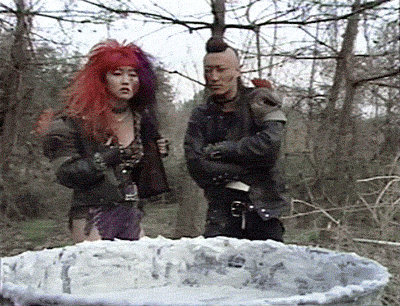
Nagai Go no Kowai Zone 2: Senki | The Concrete Avenger | 1990
#Nagai Go no Kowai Zone 2: Senki#永井豪のこわいゾーン2#Go Nagai#Hikari Hayakawa#Japanese horror#horror movies#sov horror#永井潔#hammersmith horror#vhs#90s horror#The Toxic Avenger#Toxie#horror anthology#good morning
433 notes
·
View notes
Text


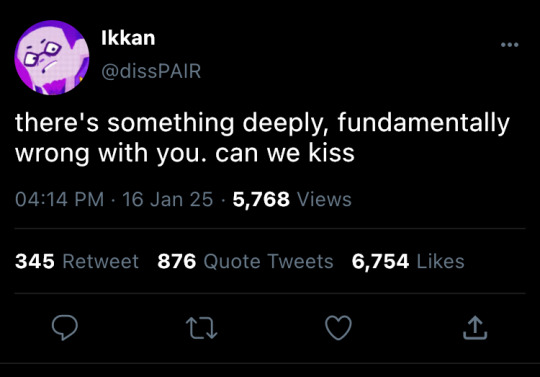
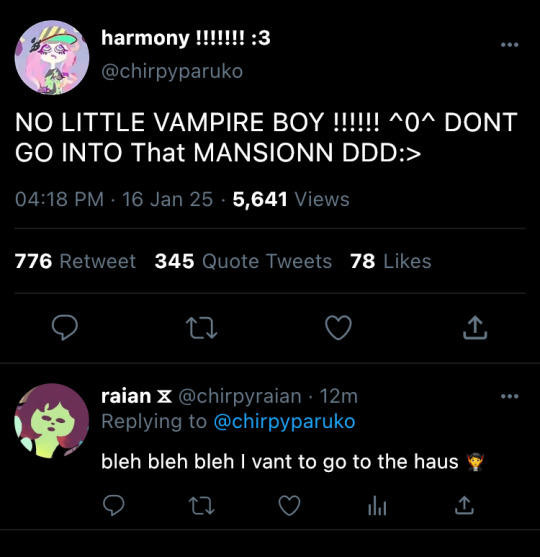
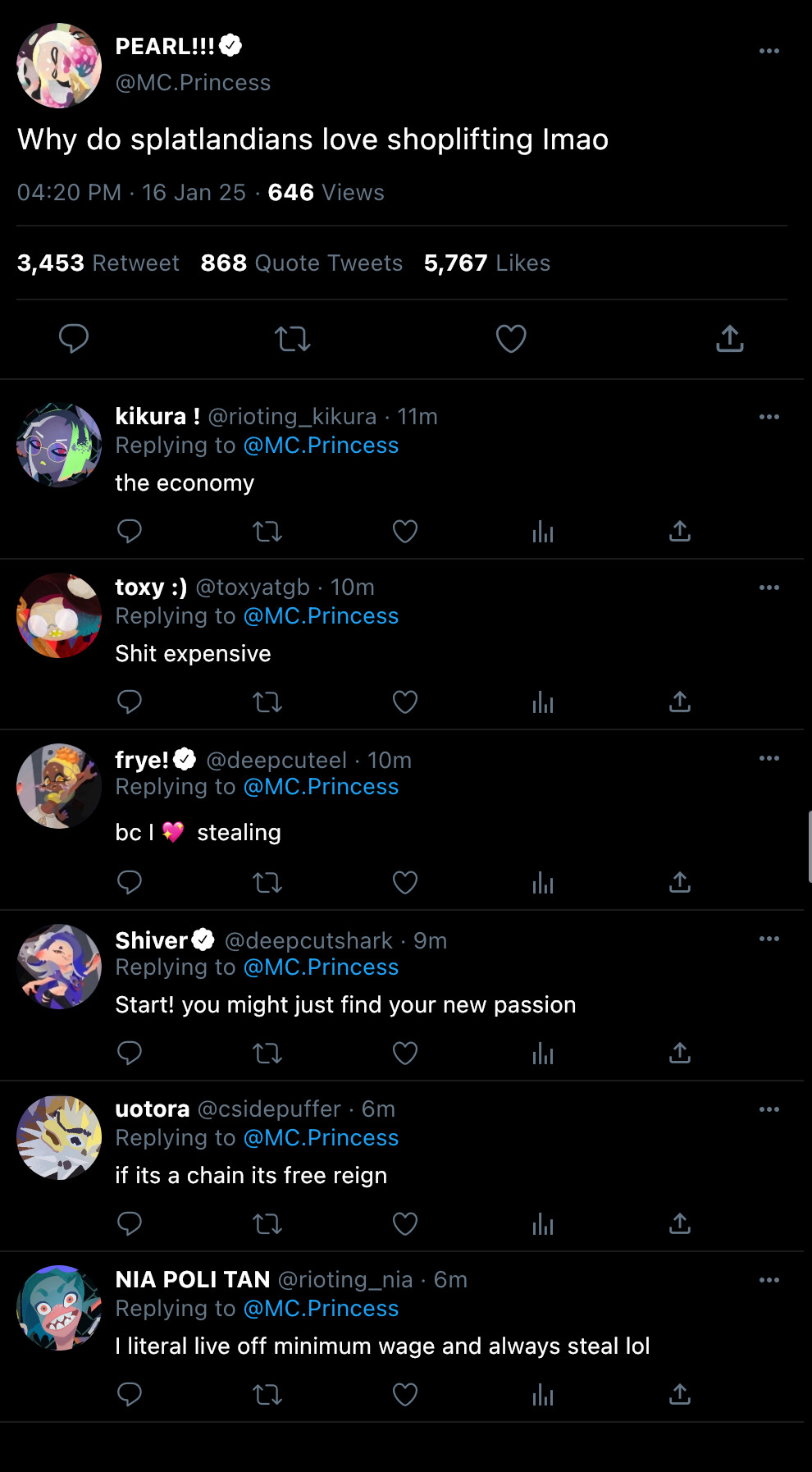
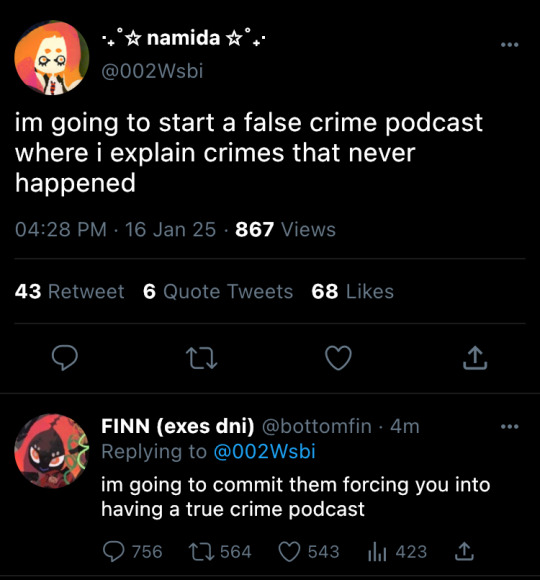
weeeeek 4 electric booger core
#harmony splatoon#tosh splatoon#uotora splatoon#new agent 3#beika splatoon#paruko#kikura c side#neo 3#ikkan splatoon#frye onaga#nia riot act#namida splatoon#toxy yatgb#shiver hohojiro#finn splatoon#crusty sean#raian splatoon#splattwitter
60 notes
·
View notes
Note
I have no other place to yap this to so I apologise in advance.
I find it interesting in Alhaitham and Kaveh’s voicelines they tend to talk about each other A LOT in a way of complaining. Such as in Alhaitham’s Good night voiceline where he says that he’d prefer that Kaveh wouldn’t be home at all because all the chaos and noise he makes in the dead of the night. Or in Kaveh’s Good Morning voiceline where he says that he hopes that you don't run into someone who ruins your day first thing in the morning.
I guess it’s what makes other people think that they despise each other’s company. Yet they’re always viewed as a pair and Alhaitham could’ve kicked Kaveh out of the house ages ago. But what’s your opinion on that?
Hiya! there's no need to apologise, this is a safe space for all haikaveh! When I tell you your ask is scratching my brain I mean ITCHING, I have so many thoughts about this part of their dynamic so thank you for enabling me <3 This turned out to be rather long, so I hope it’s helpful to you!
The contention in both Alhaitham and Kaveh’s character stories and voice lines seems to be to create intrigue about the two as individuals, and, in turn, their relationship.
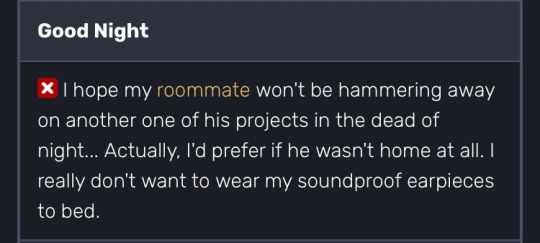

Alhaitham’s ‘good night’ voice line instantly serves as a contradiction to his character. It’s interesting, and telling, that Alhaitham, who is essentially Kaveh’s landlord, and mentions this within his fourth character story, alludes to Kaveh by using ‘roommate’ rather than ‘tenant’. ‘Landlord’ evokes a position of authority over the tenant, whereas ‘roommate’ indicates an equality between two people sharing a house – since it’s Alhaitham who advocates for the term ‘roommate’, it’s telling that, as opposed to what Kaveh believes, Alhaitham wants to establish equality between them.

In terms of what Alhaitham says in this voice line, it explicitly raises a contradiction in the form of a question: if Alhaitham is truly bothered by his roommate’s antics, why doesn’t he simply evict Kaveh?
This is relevant as this question is also posed when we initially meet Kaveh within the Archon Quest, as Kaveh states he dislikes Alhaitham’s personality, to which Alhaitham responds by saying if he bothers Kaveh so much, Kaveh always has the option to move out of the house – to which Kaveh perceives as a threat, only to then dismiss this as Alhaitham ‘changing the subject’, which seems to mean that this ‘threat’ is taken as baseless. As this isn’t called back to, this seems to be the case.


There is no real threat of eviction, and regardless of their disputes, Alhaitham ultimately gives Kaveh no ultimatum to move out. In fact, as discussed here (page 27), as we are meeting Alhaitham and Kaveh for the first time, Alhaitham allowing Kaveh to live with him contradicts his established character of living a life free of inconvenience. This instantly creates intrigue around his and Kaveh’s dynamic – who is Kaveh to Alhaitham for this exception to be made to Alhaitham’s peaceful way of life?
(An additional note of interest is that Alhaitham’s solution to the noise problem seems to be more uncomfortable than calling on Kaveh and telling him to stop his work. Alhaitham says that he’d rather not wear his noise-cancelling earpieces to bed, implying that he does so when noise is a problem at night. However, there’s no mention of Kaveh being stubborn when confronting this issue, which is why he takes to wearing his ear pieces, or any mention of confrontation at all. From this voice-line, it seems that Alhaitham avoids interaction by opting for the least comfortable option, which can be a contradiction to his character. As this is a rather brief voice-line, it’s difficult to ascertain why, but I like the idea that Kaveh is productive at night, and Alhaitham prefers not to impose on Kaveh’s work process – but this is more a headcanon than evidenced interpretation.)
Returning back to the contradiction within this voice-line, at a surface glance, this does appear to be a general complaint about Kaveh, and this can be found in Alhaitham’s lines about Kaveh, and also when discussing Tighnari. Alhaitham refers to Kaveh as ‘overly sensitive’, and ‘constantly making a fuss’.
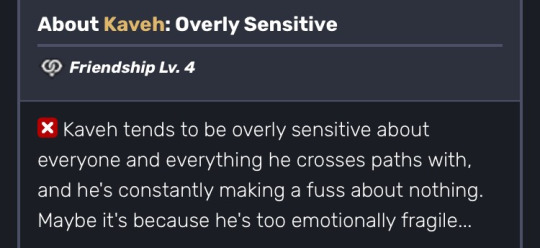
These can easily read solely as complaints, but when looking to the original CN translation, another interpretation can be found here. Alhaitham describes Kaveh as ‘caring’ or ‘tender’, which is exactly how Kaveh is described within the 3.6 special program (as per minimushiroom on twt), which can allude to how Kaveh is considerate to a fault, in that this serves as a detriment to himself.
This can be seen in Alhaitham’s other Kaveh-centred voice-line, in which he describes Kaveh buying keychains in order to provide meals for sick children, even though healthcare is free in Sumeru. Alhaitham clearly holds the view that this was a redundant action, as Kaveh, being in debt, most likely doesn’t have the money to spend on such investments that are, evidently, dubious.
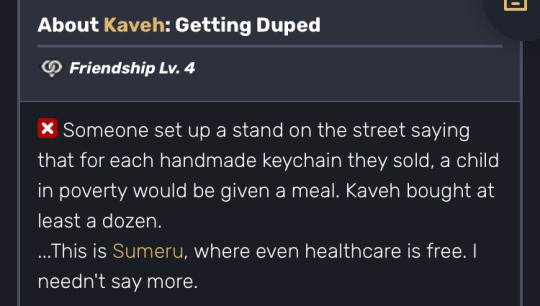
As Alhaitham provides a rational view here, this contrasts with Kaveh’s act of generosity fuelled by emotion – which highlights the contention Alhaitham has with Kaveh, in that Kaveh places himself in dangerous situations for the sake of others. However, as this can be perceived as a solely derisive line, this essential context is lacking, and can be easily misconstrued. (I think the EN translation here also coincides with this narrative, as minimushiroom notes that the original CN has Alhaitham refer to Kaveh’s sensitivity in a positive way, rather than contemptuously, as the English can be interpreted as.)
Kaveh, similarly, can be seen to complain about Alhaitham in his own voice-lines. This can be seen in the 'Good Morning' voice-line you've mentioned, where Kaveh complains about having to see Alhaitham in the morning, which 'ruins' his day. Additionally, Kaveh's voice-lines discussing Alhaitham refer to Alhaitham as ‘infuriating’ and not wanting to give Alhaitham the satisfaction of thanking him, despite Alhaitham helping him out. However, there is more nuance in these voice-lines than Kaveh simply ‘disliking’ Alhaitham, as this dislike is never stated - rather that he and Alhaitham have a difficult relationship in comparison to the ‘close’ friendship of their past.


Kaveh describes their relationship being a ‘mixed bag’, of both negatives and positives, as well as establishing a thorough understanding of Alhaitham, where other people may misinterpret Alhaitham as they ‘don’t know him well enough’. Additionally, Kaveh notes that he knows that Alhaitham can present himself in a more ‘likeable’ manner, but that Alhaitham refuses to do so, which refers to Kaveh’s contention with Alhaitham discussed within his character stories. This, in turn, generates curiosity, as it appears that Kaveh holds an in-depth knowledge of Alhaitham that the player isn’t privy to.
Referring back to Alhaitham’s ‘Good Night’ voiceline, the question raised is, if Alhaitham has a problem with Kaveh, why doesn’t he just evict Kaveh? And the answer can be found by digging further into Alhaitham’s character stories. Looking to Alhaitham’s fourth character story, it states that he is aware of the dissatisfaction Kaveh may have with their living arrangement but that ‘it matters not to him’.
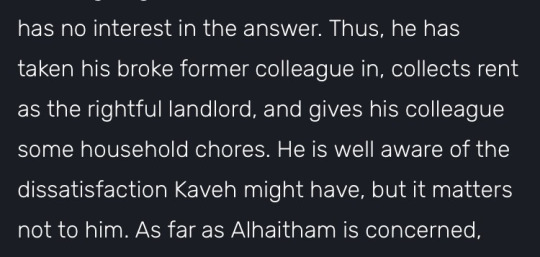
This means that he is aware that Kaveh may be unhappy with having to rely on someone else for a stable livelihood, something which his pride doesn’t naturally allow, but that this is also exacerbated due to their previous falling out and the current contentions Kaveh has with him.
At first, this can seem rather abrasive, which does fall in line with Alhaitham’s egoism as this doesn’t directly impact ‘the self’ (discussed further here), however, what immediately follows is Alhaitham’s belief that he and Kaveh are mirrors, in that his own perspective of the world will be enhanced - in the og CN, ‘completed’ -by Kaveh’s own world view.

The implication generated here with the explicit term ‘mirror’, is that, just as Alhaitham benefits from Kaveh, Kaveh, in turn, can benefit from Alhaitham. (As a side note, it is interesting then that the voice-lines in question can be seen to mirror each other – Kaveh mentions Alhaitham in ‘Good Morning’ whereas Alhaitham mentions Kaveh in ‘Good Night’.)
Returning back to Alhaitham’s character story, rather than merely reflecting each other philosophically speaking, I’d say that this also points to their respective progression as people, not just scholars.
To me, this is reminiscent of what Alhaitham says to Kaveh in A Parade of Providence – being ‘correct’, ultimately, doesn’t matter, as there is no ‘correct’ path in life, meaning that there is no ‘correct’ philosophy to shape and guide a person. Rather, Alhaitham asserts that, ultimately, their opposing philosophies are not the issue that exists between them.


The issue that does exist, then, can be surmised from Alhaitham’s actions during the event (discussed further here), in which he researches into Sachin to gauge his influence over Kaveh’s father journeying into the desert, with implicit hopes of providing closure for Kaveh, and potentially assuaging Kaveh’s guilt. This is a personal act with a personal motive; the underlying motive being concern, as opposed to an assertion of ‘correctness’.
In my opinion, I think Alhaitham’s actions during A Parade of Providence are a direct reference, and fulfilment, of Kaveh’s fifth character story. I’ve discussed here that the main reason for the ending of their friendship was them asserting the correctness of a philosophy over the other, and proposing one philosophy as the ‘solution’ to the other’s perceived flaws.
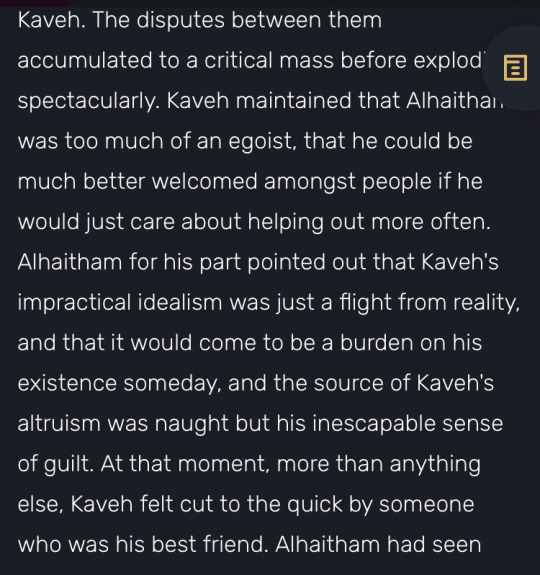

Here Alhaitham can be seen to use Kaveh’s past as the reason for his excessive altruism, implicitly referring to Kaveh’s guilt over being the supposed catalyst for his father’s demise. This final comment of Alhaitham’s appears to be the first time this has been mentioned between them, and it’s enough to be perceived as weaponisation – leading to Kaveh severing their friendship.
In A Parade of Providence, Alhaitham is shown to only have taken the role of commentator to research into Sachin, whose research we are told (by Kaveh), he has no explicit interest in, and it is heavily implied that the only reason he looked further into Sachin, was to prove to link between Sachin and Kaveh’s father. Alhaitham seems to want to absolve Kaveh of this past guilt in hopes that Kaveh will stop placing himself in the cycle of self-sabotage.
For me, when viewing this as a parallel, it highlights that Alhaitham’s motivation in speaking out during their days as students was out of concern for Kaveh, although while holding egoism as ultimately beneficial, and therefore perceivably ‘correct’. The ‘issue’ they’re currently debating is not expressly stated, and although it is unclear if Kaveh understands the implication (as discussed here), as ‘correctness’ has been overturned, there seems to be little left than the personal.
Relating this back to Alhaitham’s fourth character story, for me, Alhaitham referring to Kaveh as a mirror isn’t just referring to Kaveh as a scholar, but a person as a whole. As Alhaitham seeks to improve himself, personally, through Kaveh, it seems that he hopes to be able to benefit Kaveh in turn.
As for Kaveh’s complaints regarding Alhaitham, these can be contextualised within his own character stories. As Kaveh ultimately severed the friendship between him and Alhaitham, Alhaitham offering Kaveh to live with him, despite Kaveh revoking his previous understanding of Alhaitham (as discussed here, page 67), causes Kaveh to be overtly suspicious.
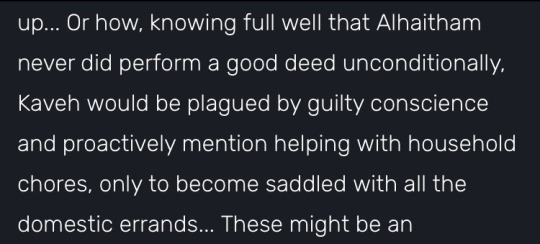
In Kaveh’s Old Sketchbook, it is mentioned that Kaveh believes there to be an ulterior motive for Alhaitham inviting him to share a house, as he believes that Alhaitham wouldn’t do something for someone else without an exchange.
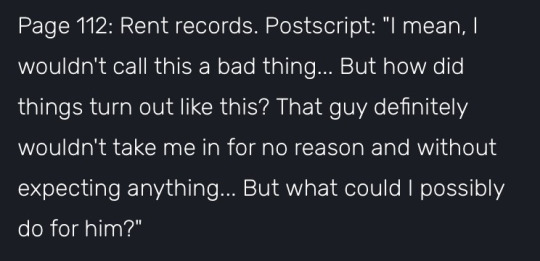
Kaveh, then, openly distrusts Alhaitham due to this unspoken motive, and although he takes on chores to ease his sense of guilt of being a perceived burden, a contention arises here. Due to their previously ended friendship, and with how Alhaitham hurt Kaveh, and how Kaveh may believe he hurt Alhaitham (discussed here), Kaveh sees no reason for Alhaitham to want him around – he treats their relationship as an exchange, asking what Alhaitham could possibly want for him.
Although Alhaitham views Kaveh as a mirror, and therefore, respects Kaveh’s perspectives, Kaveh can potentially view their opposing philosophies as a negative rather than a positive as he had done in the past (as discussed here), as it, perceivably, was what led to the end of their friendship. In this, Kaveh views Alhaitham as disparaging him and his views. As mentioned in his character story, he has no reservations in telling Alhaitham of his debt as Alhaitham has already seen through him in the past, and yet again, upon meeting at the tavern.
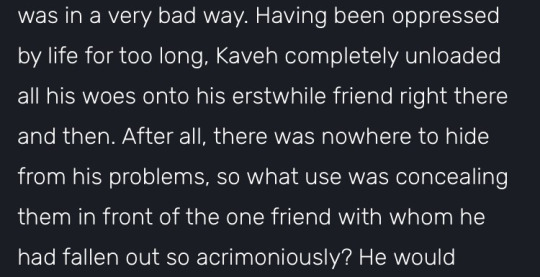
Although Alhaitham perceivably views him unfavourably, and his comments and complaints appear to propagate this interpretation, Alhaitham also seems to have no issue with keeping Kaveh around, and interacting with Kaveh, regardless of the problems Kaveh expressly has with him.
To Kaveh, it could be that as Alhaitham has already seen the worst of him, and appears to have no real issue with their stilted rapport, there is no point in donning a front and using niceties. He is open with his issues with Alhaitham, and, in turn, Alhaitham is open with him.
This appears to be a dual negative and positive for Kaveh, as he describes Alhaitham’s constancy as ‘the most unshakable part of one's past is a friend that will never change’. In this sense, his unsteady rapport with Alhaitham is reliable, and therefore, has no reason to change.

Clearly, there is a large disconnect between Alhaitham’s view of Kaveh and how Kaveh perceives Alhaitham’s view of him. As previously mentioned in the discussion of A Parade of Providence, there is an unspoken ‘issue’ between them, and this can be interpreted as dire misconceptions borne from miscommunication.
As discussed, Kaveh and Alhaitham reference each other a lot in their respective voice-lines and their character stories. This alone is enough to connect them, regardless of the cruciality of their mirror motif, as they are key figures of each other’s past, present, and seemingly, future. Despite this, it’s as you say, there’s a common perception to view them as mutually disliking each other, and, to me, this is based upon their first initial interaction, and the way they refer to each other in their own character stories and voice-lines.
It’s notable that Alhaitham refers to Kaveh in his voice-lines when Kaveh is not explicitly relevant, such as in his Good Night voice-line, and, most interestingly, when Alhaitham discusses Tighnari.

This could be because Alhaitham knows of Tighnari through Kaveh, but as this connection isn’t stated, it reads as Alhaitham mentioning Kaveh for no other reason than to complain about his perceived naivety regarding relations with others. But as this is a voice-line designated to discussing Tighnari, it’s interesting, and incredibly noticeable, that Alhaitham then discusses Kaveh instead. It’s similar to what Kaveh can be seen to do, and is observed to do by others, in relation to discussing Alhaitham.

When it comes to Kaveh, however, his complaining of Alhaitham can be seen to link with his process of dealing with troubles in his work. In his Hangout, he states that he takes his work to heart because he cares about it, which is expressed in the same quest in which Kaveh and the Traveller run into Alhaitham in the House of Daena (discussed further here, page 219).
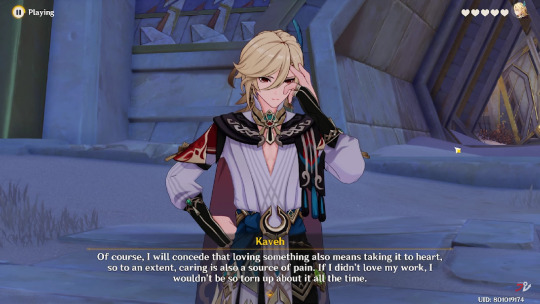
Drawing a parallel here can further contextualise Kaveh’s complaining of Alhaitham – if Kaveh truly disliked Alhaitham, there seems to be no reason for Alhaitham to remain so relevant to him, both in conversation, and in private thought. Additionally, Kaveh is described as an empathetic person, and when dealing with others, he is thusly seen to look for another perspective rather than act on his own subjective perspective.
Looking at his voice-line on Dori, for example, expresses his distaste for Dori pressuring him for Mora due to his debt, however, he also empathises with her, and states that he senses there must be a reason why Dori acts in such a way.

In contrast, this empathy can be perceived as missing in his treatment of Alhaitham, and therefore Kaveh complaining about Alhaitham can be perceived as blatant dislike – which contradicts Kaveh’s benevolence and empathy, which A Parade of Providence particularly stresses.
Kaveh’s treatment of Alhaitham can be seen as deliberately contradictory, as it can cause the player to question why Kaveh reacts in such a singular way to Alhaitham, just as why Alhaitham reacts in a singular way to Kaveh.
In reference to Alhaitham, whilst Alhaitham tends to complain about Kaveh in turn, his actions reveal him. He invites Kaveh to live with him, gives no eviction date, pays for Kaveh’s tabs willingly, (supposedly) buys wine as an apology, and goes out of his way to ensure dialogue with Kaveh – which contradicts his own character stories, in which he appears to favour solitude, and only greets those he considers his friends ‘with a nod or two’.

Moreover, Alhaitham is established as considering Kaveh a necessity to his ‘peaceful life’ he seeks to maintain (as discussed here), and can be seen to implicitly consider Kaveh one of his priorities within his Story Quest.
The idea that Alhaitham dislikes Kaveh seems to stem from Alhaitham being taken literally when voicing an opinion, or an issue, or simply joking, in reference to Kaveh – despite his character stories highlighting that Alhaitham often uses sarcasm in order to subvert expectations.

Alhaitham expressly states that he prefers to be seen as inscrutable, and unknown, by the general public, and uses subversion as a means to do so. In these character stories, Alhaitham openly encourages speculation of his own words.
Without this context, it seems easy to simplify Alhaitham to purely speaking factually when first addressing Kaveh in the Archon Quest – stating that having to explain things to Kaveh is ‘a nuisance’, and yet, it is overlooked that Alhaitham stays in the House of Daena, regardless, knowing Kaveh would find him again.
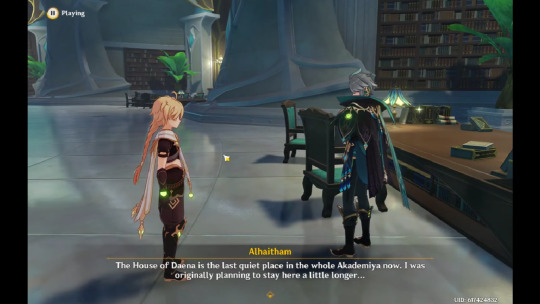
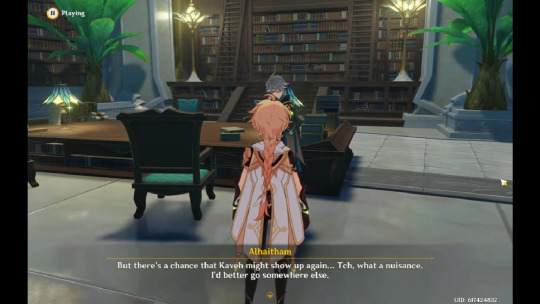
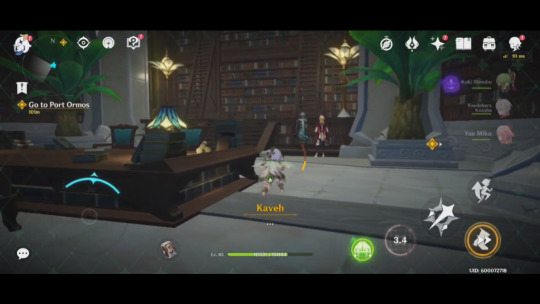
On the whole, in my opinion, Kaveh’s feelings towards Alhaitham cannot be simplified to ‘dislike’ as this is dually an inherent misunderstanding of his character, and of his and Alhaitham’s relationship, just as Alhaitham’s feelings towards Kaveh cannot be simplified to ‘dislike’ for this same reason.
In the beginning, Alhaitham and Kaveh are not supposed to be perceived as friendly, as Kaveh denies the association of ‘friends’, and Paimon describes them to the Traveller as ‘problematic’.

The reason for this is due to their character arcs being intertwined – the core issue is posed in Kaveh’s fifth character story, in that the question is raised if a compromise can be reached, if both sides of the mirror, can be balanced. At the beginning, they are entirely at odds, but even footing must be found.
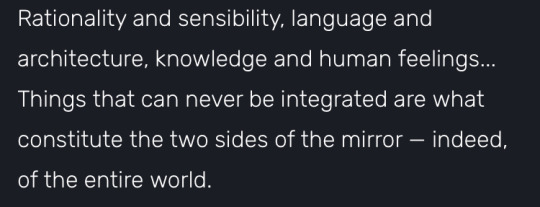
I’ve noticed a shift in online discourse after Cyno’s second story quest, as the progression in Alhaitham and Kaveh’s relationship is noticeable – deliberately, due to the flashback scene within their house (which I’ve discussed in detail here, page 122). To me, it’s more common to form the assumption that Alhaitham and Kaveh dislike each other in the Archon Quest, but with recent developments, and, hopefully, future ones, this perception is being overturned in online communities. Perhaps that’s just wishful thinking, but I’m still hopeful!
#haikaveh#kavetham#alhaitham#kaveh#genshin impact#thank you so much for your ask anon! it really ate away at my brain#haikaveh's writing is just so !?!?!? theres so many layers to peel back so a surface read of their relationship can be misconstrued as toxi#but ultimately i think these voice lines and details of their character stories are for people to question WHY they are Like That with#each other and it's one of the things i love about them that nothing is upfront or simple it really suits their themes so well#alhaitham constantly questions the world around him and flips language on its head and kaveh challenges the world with his ideals but works#with rigid principles of design and construction and he can't tell sarcasm from genuine praise which also adds to why he takes alhaitham's#words so personally... but this is improving now?? i am saying thank you cyno's second story quest <333#also the narrative that haikaveh can't stand each other seems to be more of a western thing from what i've seen online#and i think this is possibly due to the EN translation where the CN is less derisive or abrasive?#thank you to those who translate so the nuance is pointed out! <3
117 notes
·
View notes
Text
oh clea dessendre the woman that you are.... (character analysis under the cut bc i just finished the flying manor)
original clea must have the most Intense case of eldest daughter syndrome imaginable. i can't stop thinking about her after the painted clea fight bc it's like okay so you're the oldest daughter of two of the most famous and renowned Painters (with a capital P) around, big part of The Painters. and you know (and your siblings know) that your parents don't just Expect Success, they Expect Perfection from you. You have a name to live up to and their approval is Contingent Upon That So you throw yourself into the technical aspects of painting and sculpting (and Painting and Sculpting too). you make yourself a goddamn prodigy because thats what you have to do. and your younger brother tries his best but he doesn't like painting as much. he clashes with your parents and it's really fucking clear how conditional their approval is. You Cannot Fuck Up. (you love him, you spend hours and hours and hours of your childhood in his painting) (your pet rock is in his painting!) (but that is for children and you are a goddamn adult now) and then he goes and fucking dies on you, on all of you. And you decide to Go To Fucking War because you fucking loved Verso and he is never coming back. But at the very least you are going to Make Them Pay. and despite all this- despite all of this. your mother, who has demanded nothing less than Perfection From You, fucks off into a painting and makes a bunch of new, 'better' facsimilies of the family. because the current ones just aren't good enough. smiling, dancing, awful little puppets that are exaggerated and Uncanny- and she is going to kill herself doing that, and leave everything to you and dad. again. and so you have to do the parenting here. you have to clean her mess. you have to help alicia while your father deals with your mother. and you also have A War To Fight. so yeah. you take that puppet your mother made, and you make her Useful
(kind of interesting that the best technical painter out of all of the children is also the one who Does Not Believe that the paintings have a soul or a life of their own. at all.) (and it is just. so diametrically opposed to what maelle and verso see in every piece of art they love)
#clea dessendre#clea clair obscur#clair obscur#clair obscur: expedition 33#clair obscur spoilers#expedition 33 spoilers#god forbid women do ANYTHING#i read the dessendre parents as stage parents with high expectations#and genuine love for their children but like. were not good at expressing that or encouraging them directly. and so their parenting is Toxi
43 notes
·
View notes
Text
How to support your mentally ill friends - a guide

instead of saying:
you need therapy ❌️
people won't love you before you love yourself 🚫
that fictional (wo)man isn't real (s)he doesn't love you 👎
you're not an angel sent from heaven, you have a personality disorder 🤬
who the fuck are you get out of my house. is that a GUN OH MY GO- 🤮
try saying instead:
here's my credit card number ✅️
you are sexy and beautiful and amazing and sexy and perfect and sexy and sexy 👍
your fellow divine beings in heaven yearn for your return ✔️
one day you'll be famous and then all those fuckass therapists will be proven wrong 🥰
i am humbled to be graced by your presence queen. i will give you free stuff forever and you never have to work again ever 🤩
3K notes
·
View notes
Text

Silly vamp Toxi here to give yall some cookies 🍪💙
His ref sheet is here!
#i love toxi and his silly gay vampire ass#hellsing#hellsing au#hellsing ultimate#hellsing oc#atomart#atomoc#atomcard
39 notes
·
View notes
Text
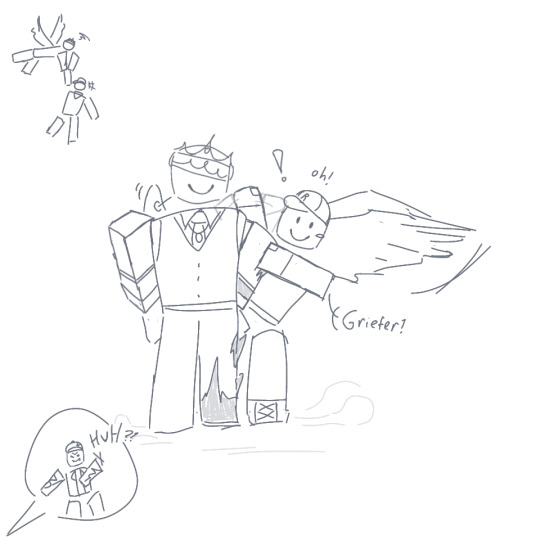
I like to think that Crowned Fallen (my avatar) and the block tales player are two different people because the vibes of Fallen is not giving hero honestly LMAO
Additional
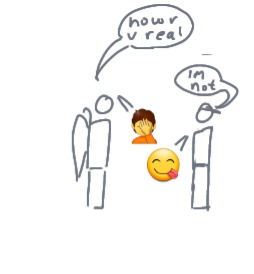
#griefer block tales#block tales#roblox block tales#block tales roblox#block tales player#block tales griefer#griefer blocktales#griefer x player#If you squint hard enough#toxichero#If you think about it#player block tales#So funfact i didnt realize until later that toxichero was actually Toxic Hero and not... Toxi Chero. Like bro-#i keep seeing it and im like “wtf do cherries/churros have to do with this ship?” UNTIL I SAW SOMEONE PUT THE SPACE#OH MY WORD IM SO FREAKING DUMB
21 notes
·
View notes
Text

do i look backed into a corner to you?

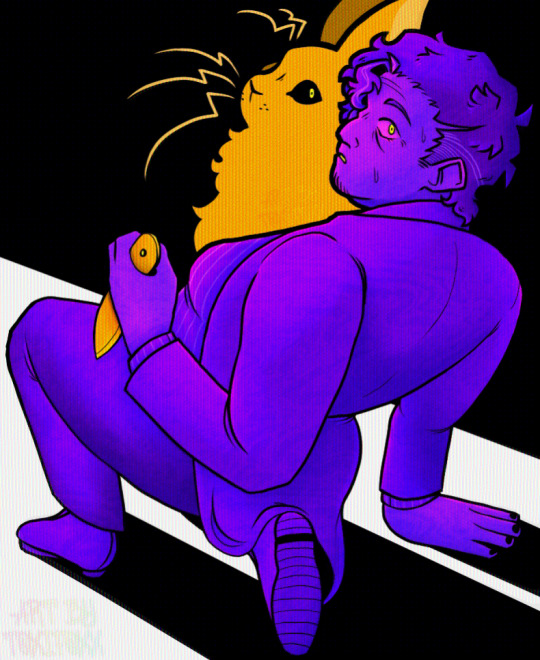
alt i liked more but thought the other one looks better w tumblr compression
#toxi's art#digital art#artists on tumblr#artwork#drawing#illustration#artistsupport#fnaf#five nights at freddys#fnaf fanart#william afton#william afton fanart#fnaf william afton#purple guy#spring bonnie
370 notes
·
View notes
Text

do NOT come to america. you WILL be forced to wear the burgerie.
#toxi's art#william afton#i could tag this as suggestive but its fucking burger lingerie. so#i did this as a joke but he DOES unironically look good in it
153 notes
·
View notes
Text


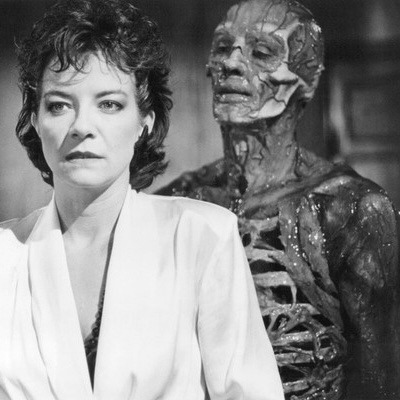

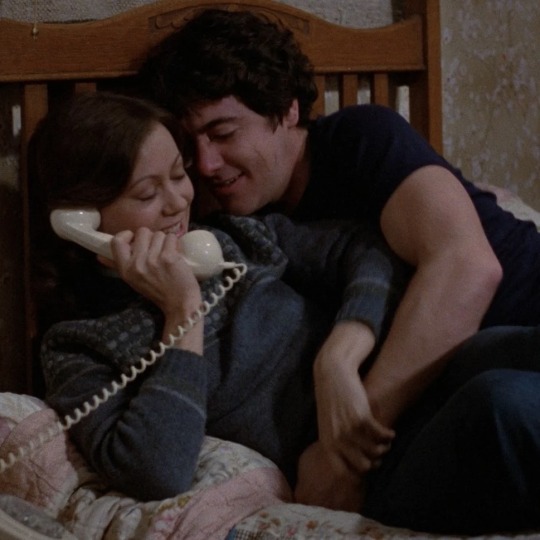

#bear with me as i COOK#toxie is a wildcard but they r so important to monster love#jeffamentertainment
186 notes
·
View notes